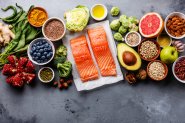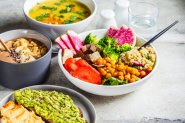Advertising Disclosure
What Food Does Your Gut Microbiome Love?

So…How’s your microbiome?
The gut microbiome has become a popular research topic. Doctors and researchers have done all sorts of tests to get to know the power of our gut microbiome. As they dig deeper, they realize that gut microbiome actually has a huge impact on our well being.
So far, research has shown that unhealthy microbiome can lead to various health problems. This includes things like weight gain or a weakened immune system, to serious diseases such as liver disease and cancer. Experts believe that having diverse and balanced bacteria in our gut is crucial for our health.
But, how to create this?
Well, the good thing is that gut microbiome is pretty resistant, and it changes on a daily basis. Meaning, it reacts to everything we’re doing, including the food and drinks we’re consuming.
So the key to improving gut microbiome health lies in our diets. Let’s take a look at which foods our gut microbiome loves and which it doesn’t.
Food Rich in Fiber and Phytochemicals

Ruairi Robertson is a nutritionist, microbiologist, and neuroscientist who explores gut microbiota. He says that what we eat matters. We should eat food that increases the number of healthy bacteria in our gut. More specifically, we should have a diet rich in fiber and phytochemicals.
Fiber and phytochemicals are mostly found in fruits, veggies, legumes, and whole grains. Research shows that these have certain benefits for our health. Dietary fiber helps preserve a healthy weight, lower cholesterol levels, control blood sugar level and regulate bowel movement. Phytochemicals also help us to stay healthy and combat disease.

For example, flavonoids in apples, berries, citrus, onions and coffee help decrease inflammation. Carotenoids in tomatoes, broccoli, carrots, and squash may improve the immune system and slow cancer growth. Anthocyanins in red wine and berries help reduce arterial stiffness and regulate blood pressure.
So, here are some foods that you’d want to add to your diet: whole grains, apples, onions, garlic, honey, nuts, asparagus, leeks, bananas, artichokes, seeds, beans, root vegetables, lentils, cocoa, red wine, chickpeas, and green tea extracts.
How much fiber is enough?
When it comes to fiber daily intake, men younger than 50 should take 38 grams whereas women under 50 should consume 25 grams. Men of age 51 and older should take 30 grams of fiber every day, whereas women should take 21 grams.
Probiotics

Fermented food is highly beneficial for our digestive and immune systems and creates better health for our gut microbiome. Adding kefir, yogurt, kimchi, and sauerkraut to your diet is just what your gut microbiome needs. Kefir contains various good bacteria, vitamins, and minerals. Yogurt contains live bacteria (which your gut microbiome loves). Kimchi contains selenium, iron, calcium, and vitamins A, B, and C. Sauerkraut is rich in fiber, B vitamins, vitamins C, and K. It also contains iron, copper, potassium, calcium, and magnesium.
Stay Clear From These Foods

Just as some foods are great for our health, others are not. You want to stay clear from artificial and ultra-processed foods. Our gut microbiome doesn’t like artificial anything, including sweeteners and supplements. Not to mention ultra-processed food. All these may reduce diversity in our microbiome, causing microbiome imbalance and various health problems. Besides, who needs “fake” food when you can get some real flavor, vitamins, enzymes and antioxidants from nature itself?
Conclusion

Follow these tips to improve your gut health and create a diverse bacteria system. This will enhance your immune system, improve your digestion, help you keep your desired weight and, above all, help you prevent or combat serious disease.







